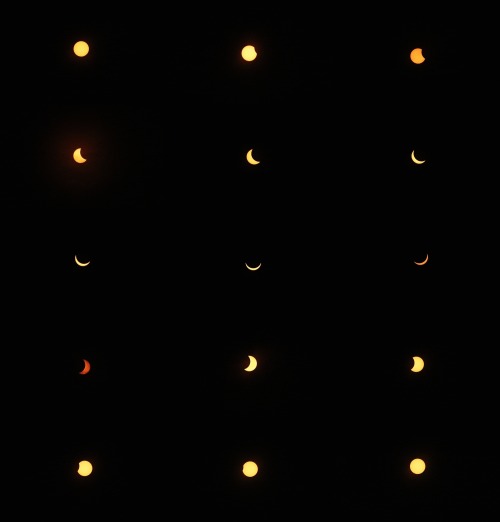We Used To Look Up At The Sky And Wonder At Our Place In The Stars. Now We Just Look Down, And Worry








We used to look up at the sky and wonder at our place in the stars. Now we just look down, and worry about our place in the dirt.
More Posts from Intergalacticnerd and Others

Valles Marineris: The Grand Canyon of Mars
Image Credit: Viking Project, USGS, NASA
The largest canyon in the Solar System cuts a wide swath across the face of Mars. Named Valles Marineris, the grand valley extends over 3,000 kilometers long, spans as much as 600 kilometers across, and delves as much as 8 kilometers deep. By comparison, the Earth’s Grand Canyon in Arizona, USA is 800 kilometers long, 30 kilometers across, and 1.8 kilometers deep. The origin of the Valles Marineris remains unknown, although a leading hypothesis holds that it started as a crack billions of years ago as the planet cooled. Several geologic processes have been identified in the canyon. The above mosaic was created from over 100 images of Mars taken by Viking Orbiters in the 1970s.
The Hubble Space telescope just sent back a new photo of the Twin Jet Nebula. Here’s what it looked like in 1997:

And now …

Whoa. But wait, we also got an updated image of the merging galaxies NGC 6240. What it looked like in 2008:

And today:

Science, you’re the best. Oh, and the explanation behind those merging galaxies and their black holes is wild.
how to get an alien to abduct you
WHOA look at the moon
me literally every night no matter what phase the moon is in (via purple-space-freak)



NASA Astronomy Picture of the Day 2016 January 27
An Airglow Fan from Lake to Sky
Why would the sky look like a giant fan? Airglow. The featured intermittent green glow appeared to rise from a lake through the arch of our Milky Way Galaxy, as captured last summer next to Bryce Canyon in Utah, USA. The unusual pattern was created by atmospheric gravity waves, ripples of alternating air pressure that can grow with height as the air thins, in this case about 90 kilometers up. Unlike auroras powered by collisions with energetic charged particles and seen at high latitudes, airglow is due to chemiluminescence, the production of light in a chemical reaction. More typically seen near the horizon, airglow keeps the night sky from ever being completely dark.


This is Kjell Lindgren. He’s a NASA astronaut who just got back from 5 months on the International Space Station. There are two reasons why this picture is hilarious:
His wife is flawless and makes bad space puns to make him do household chores.
I have that shirt. Thousands of people have that shirt. That shirt is available at Target. Which means actual astronaut Kjell Lindgren, with his wardrobe already full of NASA-issued and logo-emblazoned clothes, was at Target, saw a NASA shirt, and was like, “Yes, I am buying this because this is what I want to spend my actual astronaut salary on.”
tl;dr NASA employs a bunch of fucking nerds

In this Chandra image of NGC6388, researchers have found evidence that a white dwarf star may have ripped apart a planet as it came too close. When a star reaches its white dwarf stage, nearly all of the material from the star is packed inside a radius one hundredth that of the original star.

All Quiet in the Nursery?
The dark patch snaking across this spectacular image of a field of stars in the constellation of Ophiuchus (The Serpent-bearer) is not quite what it appears to be.
Although it looks as if there are no stars here, they are hidden behind this dense cloud of dust that blocks out their light. This particular dark cloud is known as LDN 1768.
Despite their rather dull appearance, dark nebulae like LDN 1768 are of huge interest to astronomers, as it is here that new stars form. Inside these vast stellar nurseries there are protostars — stars at the earliest stage of their lives, still coalescing out of the gas and dust in the cloud.
Eventually, the protostars will become dense and hot enough to start the nuclear reactions that will produce visible light and they will start to shine. When this happens, they will blow away the cocoon of dust surrounding them and cause any remaining gas to emit light as well, creating the spectacular light show known as an HII region.
Credit: ESO



-
 johnkrrasinski liked this · 4 years ago
johnkrrasinski liked this · 4 years ago -
 jeffersonhairpie reblogged this · 4 years ago
jeffersonhairpie reblogged this · 4 years ago -
 paynomind-briavii liked this · 5 years ago
paynomind-briavii liked this · 5 years ago -
 babywerethenewlovers liked this · 5 years ago
babywerethenewlovers liked this · 5 years ago -
 acelucky liked this · 6 years ago
acelucky liked this · 6 years ago -
 cellorockets reblogged this · 6 years ago
cellorockets reblogged this · 6 years ago -
 cameanan liked this · 6 years ago
cameanan liked this · 6 years ago -
 highfaeryes-blog liked this · 7 years ago
highfaeryes-blog liked this · 7 years ago -
 en-perpetua liked this · 7 years ago
en-perpetua liked this · 7 years ago -
 longslives reblogged this · 7 years ago
longslives reblogged this · 7 years ago -
 longslives liked this · 7 years ago
longslives liked this · 7 years ago -
 veronicamarss reblogged this · 7 years ago
veronicamarss reblogged this · 7 years ago -
 gemfabricsand reblogged this · 7 years ago
gemfabricsand reblogged this · 7 years ago -
 jonsbutt reblogged this · 7 years ago
jonsbutt reblogged this · 7 years ago -
 psyhce reblogged this · 8 years ago
psyhce reblogged this · 8 years ago -
 boppanurugo-blog liked this · 8 years ago
boppanurugo-blog liked this · 8 years ago -
 love-makes-life liked this · 8 years ago
love-makes-life liked this · 8 years ago -
 my-olympus-for-you reblogged this · 8 years ago
my-olympus-for-you reblogged this · 8 years ago -
 my-olympus-for-you liked this · 8 years ago
my-olympus-for-you liked this · 8 years ago -
 aw16st reblogged this · 8 years ago
aw16st reblogged this · 8 years ago -
 iensen-ackles reblogged this · 8 years ago
iensen-ackles reblogged this · 8 years ago -
 actually-just-me16 reblogged this · 8 years ago
actually-just-me16 reblogged this · 8 years ago -
 actually-just-me16 liked this · 8 years ago
actually-just-me16 liked this · 8 years ago -
 scryingparrish reblogged this · 8 years ago
scryingparrish reblogged this · 8 years ago -
 itshakespeare reblogged this · 8 years ago
itshakespeare reblogged this · 8 years ago -
 talialghoul liked this · 8 years ago
talialghoul liked this · 8 years ago -
 bravermansreign reblogged this · 8 years ago
bravermansreign reblogged this · 8 years ago -
 youshouldburn reblogged this · 8 years ago
youshouldburn reblogged this · 8 years ago -
 rirukuh reblogged this · 8 years ago
rirukuh reblogged this · 8 years ago -
 toxicsky reblogged this · 8 years ago
toxicsky reblogged this · 8 years ago -
 vault21 reblogged this · 8 years ago
vault21 reblogged this · 8 years ago -
 awaitingandrew reblogged this · 8 years ago
awaitingandrew reblogged this · 8 years ago -
 mr-pharma-0 liked this · 8 years ago
mr-pharma-0 liked this · 8 years ago -
 aspensmonster liked this · 8 years ago
aspensmonster liked this · 8 years ago -
 vocaltomes reblogged this · 8 years ago
vocaltomes reblogged this · 8 years ago -
 vocaltomes liked this · 8 years ago
vocaltomes liked this · 8 years ago -
 peuimporteleursnoms reblogged this · 8 years ago
peuimporteleursnoms reblogged this · 8 years ago -
 lovelyladii2011 liked this · 8 years ago
lovelyladii2011 liked this · 8 years ago -
 kindlymysterious liked this · 9 years ago
kindlymysterious liked this · 9 years ago -
 shaziara liked this · 9 years ago
shaziara liked this · 9 years ago -
 there-was-a-girl liked this · 9 years ago
there-was-a-girl liked this · 9 years ago
"Astronomy compels the soul to look upwards and leads us from this world to another." - Plato
147 posts